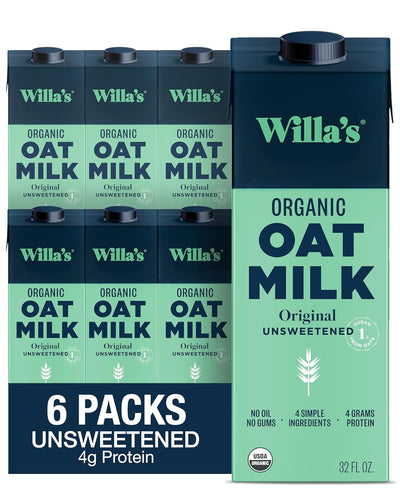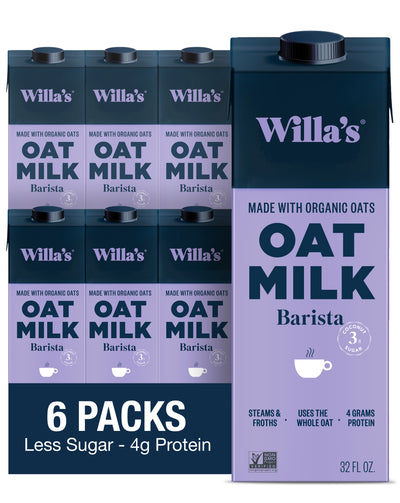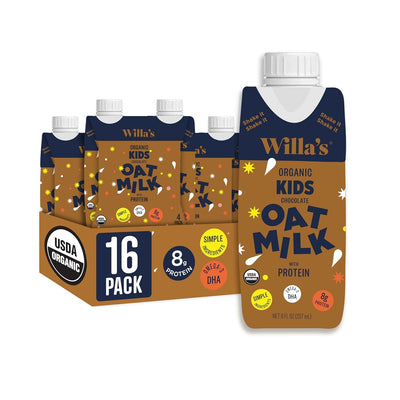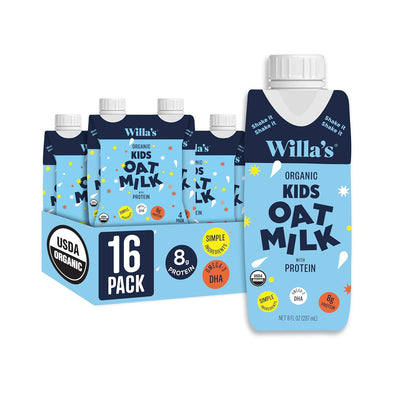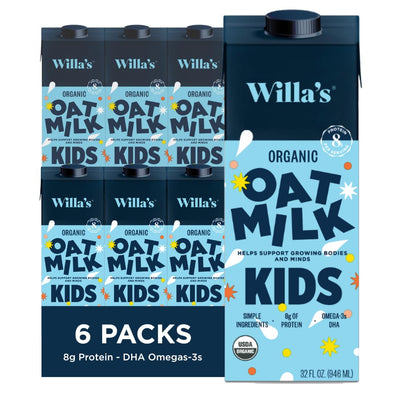Are Tetra Pak Oat Milk Cartons Recyclable?
Discerning what you can and cannot recycle can be confounding, especially with the thousands of types of packaging on the market and the varying recycling rules in different cities. We want to break down the recyclability of Tetra Pak oat milk cartons for you.
With every decision we make at Willa’s, we prioritize our values and vision of being the most environmentally conscious and sustainable plant based milk company imaginable. You cannot have a conversation about sustainability without considering the role packaging plays. Materials used for packaging, whether they are for shipping goods or casing products on the shelf, are a large portion of personal waste for each of us and a major contributor to landfills and pollution.
At Willa’s, we use Tetra Pak cartons. Tetra Pak is not perfect in terms on sustainability, and we are pushing them to do better, but here is why we prefer them over any other packaging solution available on the market. The good news is, they have made dramatic improvements over the past decade and have some innovations in the pipeline that we are especially excited about.
Why Tetra Pak?
We love using Tetra Pak instead of fully plastic packaging because, due to many factors, it is more sustainable in the long game. Our Tetra Pak cartons are made of 75% paper, 20% polyethylene, a common form of plastic, and 5% of aluminum to keep our oat milk shelf-stable. In a nutshell, we prefer this multi-material composition to 100% plastic packaging because it has a greater ability to be recycled, and reduces our overall plastic consumption, which is crucial for sustainability.
Why is less plastic so important to us?
Single-use plastics, plastics that are designed to be used and disposed of immediately, which are common in the food packaging industry, are consumed in increasing quantities and are often not recycled. In fact, only around 14% of all packaging plastics are properly recycled every year. When plastics go un-recycled, they either end up in incineration facilities, landfills, our communities, or natural water systems. All of these are harmful to wildlife, ecosystems and our health, as plastics are made with many harmful toxins that are released into the air during the degeneration and burning processes.
Included in the toxic chemicals found in single-use plastics is Bisphenol A (BPA). BPAs are hormone disruptors that have been linked to increased risk of breast cancer among other health concerns. BPA has also been replaced by Bisphenol S (BPS), which is equally harmful. This issue is especially important and hits close to home for our co-founder and CEO, Christina, who is a recent survivor of breast cancer. Doing all she can to prevent harmful chemicals from being in and around our oat milk is a top priority, which is why using BPA-free packaging like Tetra Pak is so important to us. Tetra Pak doesn't use these harmful plastics.
What does food waste have to do with packaging?
Food waste is responsible for 6%-8% of global greenhouse gas emissions. Like mentioned above, Tetra Pak cartons are lined with a thin layer of aluminum, which allows our oat milk to be stored on the shelf outside of the refrigerator until opened. Shelf-stable food packaging, like this carton, minimizes food waste as it is much less likely for retailers or consumers to need to throw away unused cartons because of expiration concerns.
Are Willa’s cartons sourced responsibly?
Our TetraPak cartons are primarily plant-based, as they are made of 75% paper. Plant-based materials are better for the environment because they can be replenished over time and enable a move away from fossil fuel-based materials like plastics. Tetra Pak sources the paperboard used in each carton from FSC-Certified forests and other controlled sources, which means new trees are continuously growing to replace what was used.
Where is Tetra Pak working to improve?
First and foremost, Tetra Pak is committed to their goal of reaching net zero carbon emissions in their global operations by 2030, which impacts all of their decisions for the future. Tetra Pak has gotten flack in the past for not being recycled by consumers as much as they should be, but they have since gotten into carton recycling programs and improved their consumer recycling education efforts. Tetra Pak is also working on a completely plant-based and compostable packaging option which we are so excited for!
So… are Willa’s cartons recyclable?
Yes, Willa’s cartons are recyclable! However, they must be recycled through a carton recycling program, which some cities do not yet have for curbside drop-off. If your city does not have a curbside pickup option, you can mail your empty cartons to one of four locations listed here who will responsibly recycle them for you. Learn more about your city’s specific carton recycling procedures here.
For more information on Tetra Pak’s sustainability efforts, visit their website.
To learn more about the carton recycling process, check out Tetra Pak's video and the Carton Council.
Looking for more on why food waste matters? Read our blog article.
Check out this blog post for a deeper dive into the sustainability of oat milk.
For delicious oat milk recipes, check out our recipe page here.

